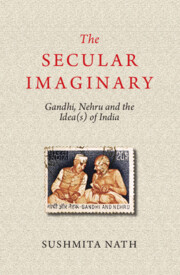Book contents
- Frontmatter
- Contents
- Preface
- Acknowledgements
- Introduction
- 1 Debating the Secular beyond the West
- 2 Gandhi’s Ashram and Political Thought: A Counter-narrative of Secularity
- 3 Gandhi’s Associationalism: A Non-state Alternative to Liberal Secularism?
- 4 Was Nehru Nehruvian? Religion, Secularity and Nehruism
- 5 Nehru and the Politics of Liberalism of Fear
- Conclusion
- Bibliography
- Index
Conclusion
Published online by Cambridge University Press: 27 September 2022
- Frontmatter
- Contents
- Preface
- Acknowledgements
- Introduction
- 1 Debating the Secular beyond the West
- 2 Gandhi’s Ashram and Political Thought: A Counter-narrative of Secularity
- 3 Gandhi’s Associationalism: A Non-state Alternative to Liberal Secularism?
- 4 Was Nehru Nehruvian? Religion, Secularity and Nehruism
- 5 Nehru and the Politics of Liberalism of Fear
- Conclusion
- Bibliography
- Index
Summary
On the idea of India, nationalist slogans, like ‘unity in diversity’ and sarva dharma samabhava, brought together the varied philosophy and politics of nationalist leaders like M. K. Gandhi and Jawaharlal Nehru. Despite their distinctive epistemology and politics, Gandhian and Nehruvian narratives came together on the question of the design of the new nation-state. Post-colonial India was to be an ‘unnational’ and secular state based on religious plurality and religious non-discrimination. What is the relationship that Gandhi and Nehru envisaged among religion, state and society under conditions of (colonial) modernity? In this book, I pursued this question to demonstrate how these prominent national leaders influenced and contributed to the discourse of secularity in modern and contemporary India. I also considered clichéd slogans and phrases, such as the Gandhi–Nehru tradition, sarva dharma samabhava and ‘unity in diversity’, as central to India's social imaginary of secularity in order to address the issue of understanding narratives of secularity in its historical context. Gandhi and Nehru are prominently seen to exemplify modern India's secular ideal, but puzzlingly, they are also considered as the epitome of traditionalism and modern Western secularity, respectively. Thus, both leaders are often invoked to defend or decry the value of secularism in contemporary India. How can Gandhi and Nehru's vision be secular and Indian, but also expressed in traditional and Western terms, such that the former's ideas and ideals are a storehouse for religious tolerance and alternatives to secularism, and the latter's vision is seen as an influence on Indian secularism, as well as its derivativeness? I sought to unravel this puzzle, apart from showing the points of affinity and departure from the Western construal of the secular and its cognates. The goal was to show that a serious theoretical reflection on Gandhian and Nehruvian thought and politics would bring to relief the varied narratives of secularity that have influenced debates on secularity in contemporary India.
Two distinctive narratives of secularity emerged in Gandhian and Nehruvian political thought and practice, which together influenced India's secular imaginary as expressed in the Gandhi–Nehru tradition, and idea(l)s of sarva dharma samabhava and ‘unity in diversity’.
- Type
- Chapter
- Information
- The Secular ImaginaryGandhi, Nehru and the Idea(s) of India, pp. 231 - 236Publisher: Cambridge University PressPrint publication year: 2022



